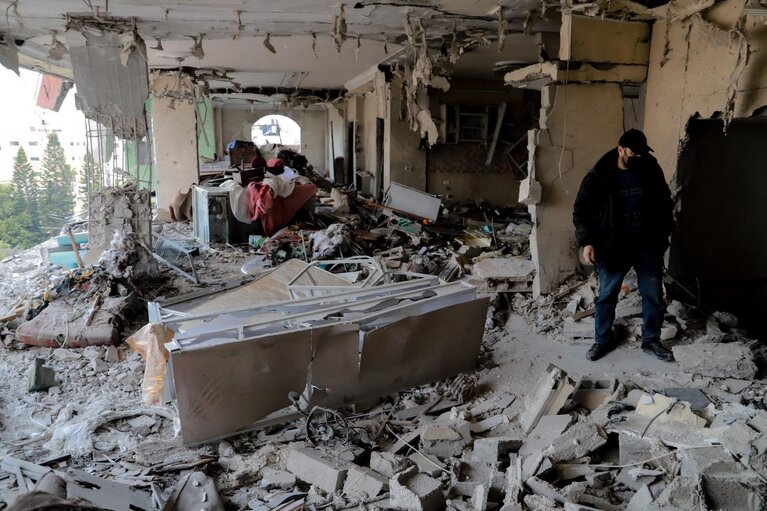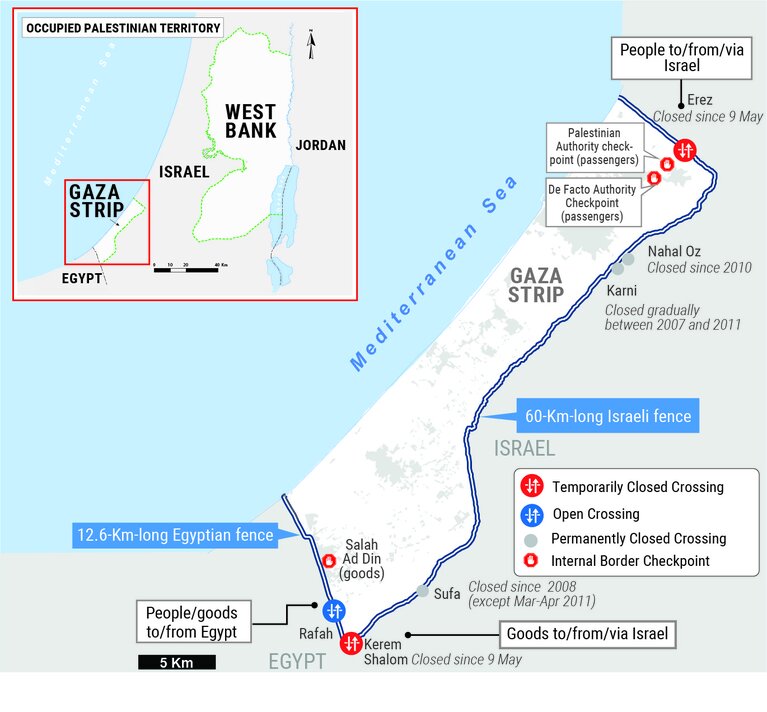Escalation of hostilities between Israeli forces and Palestinian armed groups in Gaza | Flash Update #1 as of 17:00, 10 May 2023
KEY POINTS
- On 9 May 2023, before dawn, the Israeli military launched an operation codenamed “Shield and Arrow.” On 9 May and in the afternoon of 10 May, Israeli forces carried out airstrikes and shelling on multiple targets across the Gaza Strip. In the afternoon of 10 May, Palestinian armed groups in Gaza fired numerous rockets from multiple locations towards Israel.
- As of noon on 10 May, the United Nations (UN) had verified the killing of 16 Palestinians, including ten civilians, four members of armed groups and two whose status is yet to be confirmed. Among the civilians were three girls, one boy, four women and two men. The Gaza Ministry of Health (MoH) has reported an additional four fatalities today; this information is not yet verified by the UN.
- As of 16:30 on 10 May, according to the Gaza MoH, 42 Palestinians have been injured, including children and women. Some of the wounded are reportedly in critical condition.
- Twenty-eight families, comprising 144 people, whose homes were destroyed or damaged in the 9 and 10 May airstrikes , have been internally displaced. All are staying with host families.
- According to the Gaza Ministry of Public Works and Housing, 11 housing units have been destroyed and 27 housing units have been severely damaged and became uninhabited. In addition, 139 housing units have reportedly been otherwise damaged.
- The Israeli authorities have kept their two crossings with Gaza closed for the second consecutive day. People who hold Israeli issued permits, have not been allowed in and out and essential commodities, including food and fuel, have not entered.
- Among those unable to exit were 142 referred patients and their companions, with scheduled appointments at medical facilities in the West Bank, including East Jerusalem, or in Israel. Five of the patients reportedly need lifesaving interventions that are not available in Gaza .
- The Gaza Power Plant (GPP), which relies on ongoing imports of fuel from Israel, was forced to reduce operations, with electricity provision now limited to 12-14 hours per day, on average. This places at risk the continued provision of essential services.
SITUATION OVERVIEW
On 9 May, at 02:00, the Israeli military attacked several sites across Gaza, killing three Palestinian Islamic Jihad members in their homes, along with ten family members and neighbours, and hitting multiple other targets. Among the 13 fatalities were four children and six women. According to Gaza MoH, another twenty were injured, some severely. Israeli authorities imposed a complete closure of their crossings with Gaza, preventing the movement of people and commodities in and out.
The buildings that the Israeli forces targeted included residential apartments, raising concerns whether sufficient precautions were taken to avoid, or to minimize, incidental loss of civilian life, injury to civilians and damage to civilian objects, and whether Israeli forces demonstrated respect for the prohibition of indiscriminate attacks and the principle of proportionality.
On 9 May at 07:00, shrapnel was found inside an UNRWA logistics facility in Deir Al Balah. This resulted from Israeli airstrikes in the area; no injuries were reported.
On 9 May at about 17:00, an Israeli airstrike hit a vehicle in Khan Younis, reportedly killing two Palestinian men and injuring two others.
On 10 May, at noon, Israeli forces conducted airstrikes in Khan Younis and Rafah, resulting in one fatality and one injury, and damages to property, according to initial local reports.
On 10 May at about 13:00, Palestinian armed groups in Gaza fired rockets from multiple locations towards Israel; raising concerns of the inherently indiscriminate nature of most of the projectiles and the targeting of Israeli civilians. Exchanges of fire continued throughout the afternoon and evening.
The situation in the West Bank has also been tense:
On 9 May, Israeli forces operated in the old city of Nablus, where over 100 people were injured. Twelve of them, including a child, were shot with live ammunition. During the operation, two Palestinians were arrested, including one who, according to the Israeli military, was the target of the operation.
On 10 May, Israeli forces raided Qabatiya (Jenin), where they shot and killed two Palestinian men who, according to the Israeli military, had shot at them. A third Palestinian was injured. In a separate incident, in Tubas, an Israeli soldier was severely injured by shrapnel in an alleged exchange of fire, according to Israeli authorities.
HUMANITARIAN OVERVIEW
The escalation has resulted in casualties and destruction of property, worsening the humanitarian situation in Gaza. The UN Human Rights Office (OHCHR ) confirmed 16 Palestinians killed, ten of whom are civilians, including four children and four women (as of 10 May at 12:00pm). MoH in Gaza has reported four additional fatalities, not yet verified by the UN. According to MoH, 42 Palestinians have been injured, and some of them are in critical condition.
According to an initial assessment conducted by the local Ministry of Public Work and Housing , 38 housing units in Gaza sustained significant damages, including 11 that were destroyed and 27 that were severely damaged, becoming unhabitable. In addition, 139 housing units were otherwise damaged. Overall a total of 46 families have been affected, of which 25 families are displaced, comprising 133 people.
Protection Cluster partners are monitoring and documenting possible violations of international humanitarian law and international human rights law, as well as the number of fatalities.
According to the Israeli authorities, at least ten Israelis were injured while running to shelters, and three required medical treatment for shock suffered during rocket fire from Gaza. Israeli sources reportedly stated that more than 270 rockets had been fired from Gaza. Some 205 of the rockets reportedly crossed into Israel, including 62 that were intercepted and three that landed in urban areas, causing damage to one empty house and one kindergarten. Reportedly, 65 of the rockets fell short in Gaza or at sea, and the rest landed in open areas without causing damage.
For the second consecutive day, both Israeli-controlled crossings, Erez (for people) and Kerem Shalom (for goods), are closed. The closure is preventing the access of hundreds of people to and from Gaza, including patients and workers, among them aid workers, and preventing the entry of over 300 truckloads of goods a day carrying vital items such as food, medical supplies and fuel. Despite the ongoing ban on the entry of goods, there are currently no reports on shortages of essential items at local markets. The exit of goods from Gaza to markets in the West Bank, Israel or abroad, including agricultural produce, is also prohibited, further exacerbating the dire situation of thousands of farmers and their families.
Gaza’s main hospital, Ash Shifa, remains on high alert. There is a sense of panic among people, with long lines forming at bakeries, fuel stations and markets.
According to MoH in Gaza, the closure has prevented 142 patients and companions from travelling to receive treatment in Palestinian or Israeli hospitals outside. MoH in Gaza stated that five of those patients were in need of critical lifesaving intervention.
Also due to the closure, the available fuel for the operation of the Gaza Power Plant is being depleted, forcing a reduction in electricity production. This has resulted in a reduction of power supply to between 12 and 14 hours per day, seriously undermining the provision of services, including health and water, sanitation and hygiene (WASH).
On 9 May, MoH in Gaza issued and disseminated an appeal urging partners to release pre-positioned items and contingency funds, to secure urgently needed health commodities.
According to UNRWA and the Ministry of Education and High Education, all schools in Gaza are closed for the second consecutive day. Schools in southern Israel have also been kept closed.
UNRWA suspended food distribution on 10 May and kept other services, including WASH and logistical services, functioning. Twenty-two UNRWA health centres continue to open for the provision of essential primary health care services, according to the prepared emergency plan. Services are provided to non-communicable disease (NCD) patients, and pregnant women with high risks. Vaccination, emergency dental and laboratory services are also provided, in addition to tele-medicine services.
The Protection Cluster is closely monitoring the situation, with OHCHR and cluster partners monitoring and documenting possible violations of international humanitarian law and international human rights law, and civilian fatalities. Mine Action partners have indicated that they will activate virtual awareness on Conflict Protection and Preparedne ss (CPP) and Explosive Ordnance Risk Education (EORE) remotely, including on social media. The Child Protection Area of Responsibility will be assessing the impact of the emergency on vulnerable groups, especially children, and as with previous emergencies, anticipates that responses will be needed, including expanded, structured, and specialized child protection, as well as case management, and mental health and psychosocial support services aimed at supporting vulnerable children and affected families.
The Gaza Inter Cluster Coordination Group continues to monitor the impacts of developments in order to adapt humanitarian responses to new and growing needs throughout Gaza.











